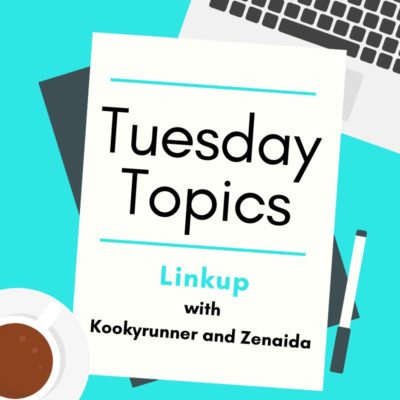
I am a firm believer that recovery is important — and often overlooked by runners. I have written about the need for it many times (see the bottom of the post for links to more on recovery).
How do you know when it’s time for a break?
I’m not talking about how to recover, but how to know it’s time to recover. Before you get yourself into trouble with overuse injuries or burn out.
I think it boils down to one thing: Are you happy when you’re not running? Of course we all get tired towards the end of a training cycle. One more cold run, one more windy run, one more wet run, one more hot run . . . it can all seem like too much. It’s normal to feel this way if you’ve been working hard for a long time.

Ask yourself this: will I get FOMO if I’m not running? If the answer is no, you are probably ready for that break. Do I feel as though I have to run, rather than I get to run?
The other time it’s time for a break, and this is much more difficult to listen for, is when your body is simply begging for it. Sometimes that comes at a really inconvenient time: when you have a big goal race or even multiple goal races all lined up — ones that really excite you — but your body just can’t take the training. Those little niggles start turning into bona fide pains.
It’s hard to let go of those dreams and give your body the rest it’s begging for, but sometimes it’s the best decision you can make. Often you come back even stronger because you address the problems you’ve been trying so hard to ignore.
Will I lose my running fitness?
The short answer is probably not. If you’re an experienced and/or consistent runner, you won’t start losing much endurance for a couple of weeks. It will probably come back quickly, too.
Beginning runners, who haven’t been running as long or as consistently, will most likely lose their fitness more quickly. I think it’s even more important for beginners to take that break rather than risk burn out — they are much more likely to throw in the towel altogether because it’s “just too hard”. Even beginners won’t completely lose their running fitness, but most likely it will feel much more like starting from zero again.
You will start losing your structural fitness (muscles, ligaments, tendons, etc) quicker. That’s why it’s a good idea to come back running slower, not the pace you were running when you stopped — you’ll feel as though you can run the same pace, but it takes your body a while to adapt to that pace again. Adding in strength training during your break can help you keep some of your structural fitness, but there really isn’t a replacement for pounding the pavement.
Why take the break?
It’s counterintuitive in some ways, I know: if working hard got me here, how far can I go by working even harder? Just like it’s counterintuitive that running slower (sometimes) will actually help you to run faster.
Being forced to take weeks or months off for a nagging injury or a stress fracture or worse will set you back much further. It’s a really fine line to walk, of course. Between pushing yourself hard to find your edge — and pushing yourself right over the edge.
Taking that break will help you fall in love with running all over again. You’ll come back stronger — mentally and physically ready to run; wanting to run. If you’re not looking forward to it, then your break was too short.
More information about recovery:
Here are a few other posts I’ve written on recovery:
- 8 Ways I Recovered from my Longest Long Runs Ever
- 5 Ways to Recover Faster
- 5 Ways to Recover Better
- 5 Signs You Need Rest
- Rest is Not a 4 Letter Word
- Are You Really Recovered?
Maybe I am a little obsessed with recovery. That’s because I think it’s so important!

Linking up with Zenaida Arroyo and Kim @ Kookyrunner
This week I am also joining up with Running on Happy, Suzlyfe, Crazy Running Girl, and Coach Debbie Runs each week for the Coaches’ Corner linkup


Sounds like you were ready for a break.
Everyone is different. Older runners lose their fitness quicker. Or maybe just me. Only running once a week definitely has affected my fitness.
I don’t feel like I have to run. I enjoy it and need it Esp. the social aspect of it and competiveness of racing.
I may feel like you do after marathon training. It’s the long runs that probably make runners feel like they HAVE to.
My leg better heal. I had major FOMO not doing Running of the Green last Sat.
LikeLiked by 1 person
I considered another half, but decided it just wasn’t the right time. I could do it, but it’s not always wise to do something just because you can (and no, that isn’t aimed at you, I’m talking about myself, which is why I wrote the post in the first place).
LikeLike
I tend to take a break when running becomes more of a chore rather than a thing I like to do. I tend to take a running break (usually a week off from running) about 2-3 times a year. I think it helps that I enjoy other ways to get in my exercise too.
LikeLiked by 1 person
I used to take breaks more often — when I first started running I’d always take a break after a half.
You can handle more as you get more experienced, but sometimes you still need that break.
I’m the same way — I have many forms of fitness I truly enjoy, so I always have ways to keep myself active. I think that’s a really good thing, Kim!
LikeLike
I’m so bad a bout taking a break. It’s not quite fomo, but I really get in a funk when I can’t workout. So, I take a break when my healthcare professional insists on it, but I know that’s not the best approach! I can take a break on vacation, so maybe I need more of those.
LikeLiked by 1 person
I rarely take a long break from working out . . . but I am pretty good at listening to my body and knowing when it’s not a good idea to push so hard (but not always!).
Oddly enough, I don’t take breaks on vacation. Or maybe not odd, since they’re almost always racecations . . . there are still 31 states. That’s a whole lot of states!
LikeLike
I think you are really smart to take your recovery so seriously. I get very sad when I can’t run with my group bc of injury. I decided to take an extra day off today for the ankle and wait until Thursday to run and I am already struggling. I know it’s the right thing to do though. Thanks for the mini therapy sesh right when I needed it 🙂
LikeLiked by 1 person
Glad I was able to help. I run alone a lot, maybe that’s why it’s easier. And then again, I’ve always been an introvert & marched to the beat of my own drum.
Sometimes it’s definitely harder than other times to take that break.
LikeLike
I blame social media for pushing people to run #alltheraces without adequate attention to rest and recovery. You know I’m a fan of the Runbattical. After London I suspect a pretty juicy one is in my future.
LikeLiked by 1 person
You will have earned it!
LikeLike
Great post. I was just talking to a friend at the weekend who did mad race after mad race all one year with no recovery in between and also no strength training or yoga or even stretching. And yes he achieved stuff but then he broke down. I’m in it for the long term so I’m careful about recovery!
LikeLiked by 1 person
That’s too bad for your friend. It’s always sad when people learn that way. It’s really hard to make wise decisions sometimes, though.
LikeLiked by 1 person
Great post, you are right on every topic. For me it’s hard to stop to recover ,,,, I feel bad if I don’t run. During the worst periods the normal substitute are the long walks but it is not the same. In the past it was the pool but I cannot swim anymore after the terrible incident on my shoulder. It is disappointing not to enter the scheduled races, to lose the speed and the mileage.
LikeLiked by 1 person
I would definitely be very sad if I couldn’t swim. 😔 The trick is to remember that that rest will keep you running.
LikeLike
I think NOT running is much harder than running, but sometimes I need a break from the distance stuff. When I have shorter races on my schedule, my running life is much more stress-free. I think I naturally gravitate to the shorter races rather than the marathons. I do suffer from FOMO! 🙂
LikeLiked by 1 person
I do like the challenge of half’s & it’s not as life consuming as fulls! But I enjoy shorter races, too.
LikeLike
I think when running is no longer fun or becomes a chore it’s break time for sure.
LikeLiked by 1 person
Although sometimes when you’re training for a big goal race it does seem to become a chore — although that’s all in how we think about it. It’s such a fine line!
LikeLiked by 1 person
I agree!!! I’ve lost my mojo a bit so haven’t been running as much. My plan is to get a couple of miles in after work today.
LikeLiked by 1 person
I haven’t really lost my mojo, just no big goals (running-wise) right now. And now I seem to be coming down with something — which I’m definitely fighting!
LikeLiked by 1 person
Oh no!!! I hope you feel better soon!!
LikeLiked by 1 person
When I had my forced 3-month sabbatical, I had some FOMO…but not as much as I’d anticipated. Probably because I knew I couldn’t run, right? I stayed active with all kinds of walking and cross-training, and kept my eye on the big picture (running AFTER everything was totally healed), and it served me well.
LikeLiked by 1 person
Oh, I know a lot of people with major FOMO even if they know running is not in their best interest. 🙂
The fact that you accepted the situation and found other ways to stay active is why you came back so strong! Good job Kim!
LikeLike
I just walking 20 minutes a day.
Break in exercise might have a negative effect to all of us.
Have a great day
LikeLiked by 1 person
Walking is a great way to exercise.
Sometimes breaking up with exercise is the right thing to do — but obviously you don’t want to drop it forever!
LikeLike
It is so important to give yourself recovery time. It’s also very hard to do it. The end result will be worth it, though. I think we all feel better when we give ourselves periodic breaks.
LikeLiked by 1 person
I agree! But yes, it can be hard to do.
LikeLike
When there are days when I don’t want to run at all, that’s when I know I need a break. I used to feel guilty because I would see other people post their runs and realize that I had no reason not to run. So much pressure because of social media. Now I just do my own thing. I only worry about me, myself, and I.
LikeLiked by 1 person
I pretty much always do my own thing. 🙂 Although I will definitely have FOMO when my friends do their 15k next month — just not something I can swing right now, although I wish I could!
LikeLiked by 1 person
Listening to your body is SO important – last week I was sick, and I knew that if still went to barre and spin class that my body would be suffering worse in the long-term. It’s sometimes hard to admit when you need to take a break, but patience is the name of the game when it comes to running!
LikeLiked by 1 person
Unfortunately this week I’m having to take a break due to illness myself. I hope you’re feeling better Janelle!
LikeLike
taking a break and recovery is so so important but VERY hard for most runners I know. I was just talking to my trainer tonight and I said to him “i’ve never experienced a marathon without either neuroma pain or nerve pain in my foot” And it was that pain that I had that caused a chain reaction in my entire left side that had me crying at the finish line of the Athens marathon. And I wasn’t crying because I finished! At that moment I knew – I HAD to take a break. And I spend two years watching my husband and my friends running #alltheraces and improving and getting stronger and I was… well, recovering. I had to go through a lot to get to a place where I could start training again like that, but in the end it was worth it. That’s what we have to keep in mind. Recovery is just as worth it as training and running a strong Half or Marathon.
LikeLiked by 1 person
It does sound like all that hard work has paid off, though. Good for you for putting in the time.
LikeLike